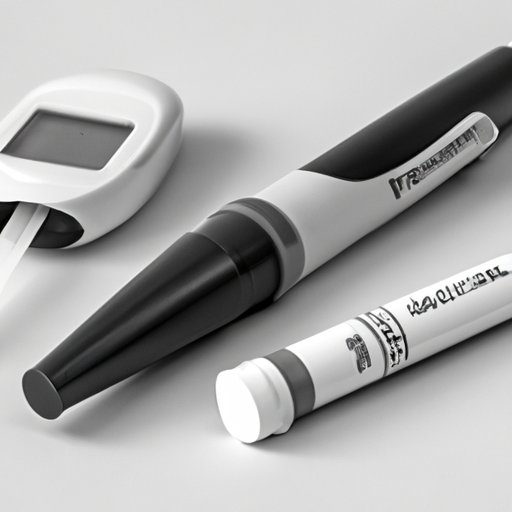Introduction
Diabetes is a complex disease that affects our bodies’ ability to convert food into energy, leading to high blood sugar levels. Insulin is a hormone produced by the pancreas that helps regulate these blood sugar levels. However, many people with diabetes need additional insulin to manage their blood sugar levels effectively. The purpose of this article is to explore which type of diabetes requires insulin and its importance to diabetes management.
Insulin: The Life-Saving Hormone for Type 1 Diabetes Sufferers
Type 1 diabetes is an autoimmune disease where the immune system attacks and destroys the cells in the pancreas that produce insulin. As a result, people with type 1 diabetes do not produce insulin, and their bodies require external sources of insulin. Insulin therapy is a life-saving treatment for people with Type 1 diabetes because it allows them to manage their blood sugar levels and prevent severe complications.
Without insulin therapy, people with Type 1 diabetes may experience symptoms such as constant hunger, fatigue, and weight loss. In severe cases, high levels of glucose in the blood can cause diabetic coma or even death. Insulin therapy allows people with Type 1 diabetes to lead active and healthy lives.
Understanding the Difference Between Type 1 and Type 2 Diabetes: Why Insulin is Necessary
Type 2 diabetes is the most common form of diabetes, accounting for around 90% of diabetes cases worldwide. Unlike Type 1 diabetes, people with Type 2 diabetes produce insulin, but their bodies are not always able to use it correctly. Insulin is necessary for Type 2 diabetes, but not always prescribed immediately. Instead, doctors may first recommend lifestyle changes or prescribe oral medications to help manage blood sugar levels.
Insulin therapy may become necessary when lifestyle changes and oral medication are no longer effective. The decision to use insulin therapy for Type 2 diabetes depends on individual cases and should be discussed with a healthcare provider.
The Insulin Myth: Debunking Misconceptions About Who Needs It for Diabetes
Some people believe that insulin therapy is only for people with severe diabetes, and should be used as a last resort. This misconception is untrue. Insulin therapy is essential for people with Type 1 diabetes and sometimes necessary for people with Type 2 diabetes. Putting off insulin therapy when it is necessary can lead to severe complications and worsen blood sugar control.
Another misconception about insulin therapy is that it leads to weight gain. However, weight gain is typically due to improved blood sugar control, which is essential in avoiding complications such as vision loss, kidney failure, and nerve damage.
The Essential Role of Insulin in Managing Type 1 Diabetes
Insulin helps manage Type 1 diabetes by allowing glucose to enter cells to produce energy. Without insulin, glucose accumulates in the bloodstream, leading to a range of symptoms and complications. Insulin therapy provides a steady supply of insulin, allowing people with Type 1 diabetes to manage their blood sugar levels more effectively.
However, finding the right dosage can be challenging as too little insulin can cause high blood sugar levels, while too much insulin can cause low blood sugar levels, leading to hypoglycemia. Hypoglycemia is a medical emergency that can cause seizures or even fainting. It’s crucial to work with a healthcare provider to ensure the correct dosage is maintained.
Why Insulin Therapy is Crucial for Type 1 Diabetes Patients: Exploring the Science Behind It
Insulin therapy replaces the lost insulin in the body due to Type 1 diabetes. It temporarily lowers your blood sugar levels by transporting glucose from your bloodstream into the cells. The more insulin you use, the more glucose is transported from the bloodstream, which reduces high blood sugar levels.
Insulin therapy also has multiple benefits, such as reducing the risk of long-term complications such as blindness, kidney failure, and nerve damage. It can also lower HbA1C levels, the average blood glucose levels over the last two to three months, leading to better overall blood glucose control.
Real-life success stories of individuals with Type 1 diabetes using insulin therapy prove that it is a highly effective treatment.
From Diagnosis to Treatment: Managing Type 1 Diabetes With Insulin
The diagnosis of Type 1 diabetes involves a blood test, with symptoms of frequent urination, excessive thirst, and fatigue. An Endocrinologist or diabetes specialist will work with you to develop insulin therapy management and lifestyle plan tailored to your needs.
The insulin therapy management involves a range of insulin types, including short-acting, long-acting, and combination therapy. An insulin pump is also a popular option for people with Type 1 diabetes. These devices provide a steady amount of insulin throughout the day, eliminating the need for multiple injections.
To manage Type 1 diabetes effectively, you must avoid skipping insulin doses, monitor blood sugar levels regularly, and follow a healthy lifestyle plan. Balancing insulin doses with life’s demands, such as exercise and diet, is essential in managing Type 1 diabetes.
Conclusion
In conclusion, insulin therapy is a vital treatment for Type 1 diabetes and sometimes needed for Type 2 diabetes. It is necessary to dispel misconceptions about insulin therapy and encourage all diabetes sufferers to seek appropriate treatment and support. Insulin therapy is life-saving, allowing people with Type 1 diabetes to maintain better blood sugar levels and avoid the dangerous complications of high blood sugar levels. Working with healthcare providers to ensure the right dosage is maintained, monitoring blood sugar levels, and following a healthy lifestyle plan is vital in managing Type 1 diabetes effectively.
